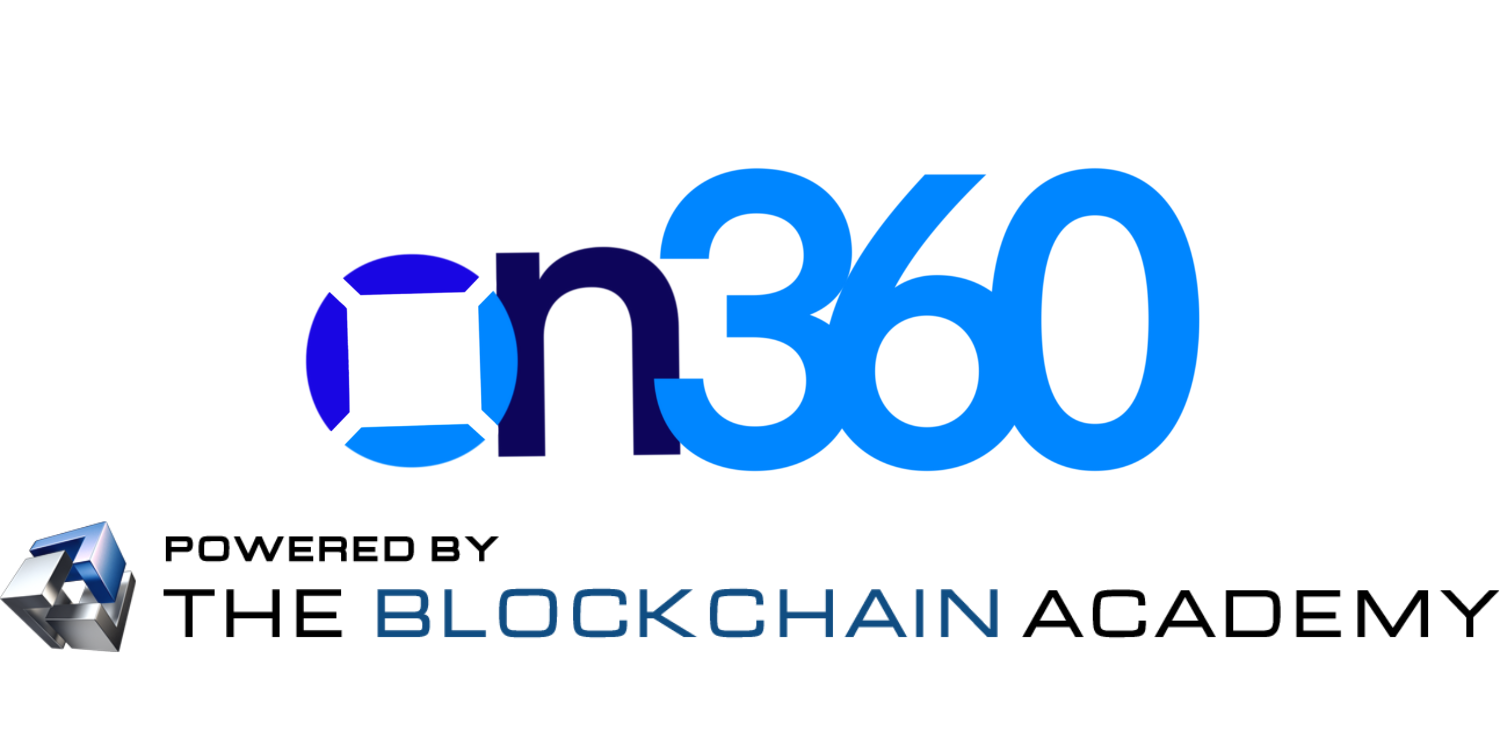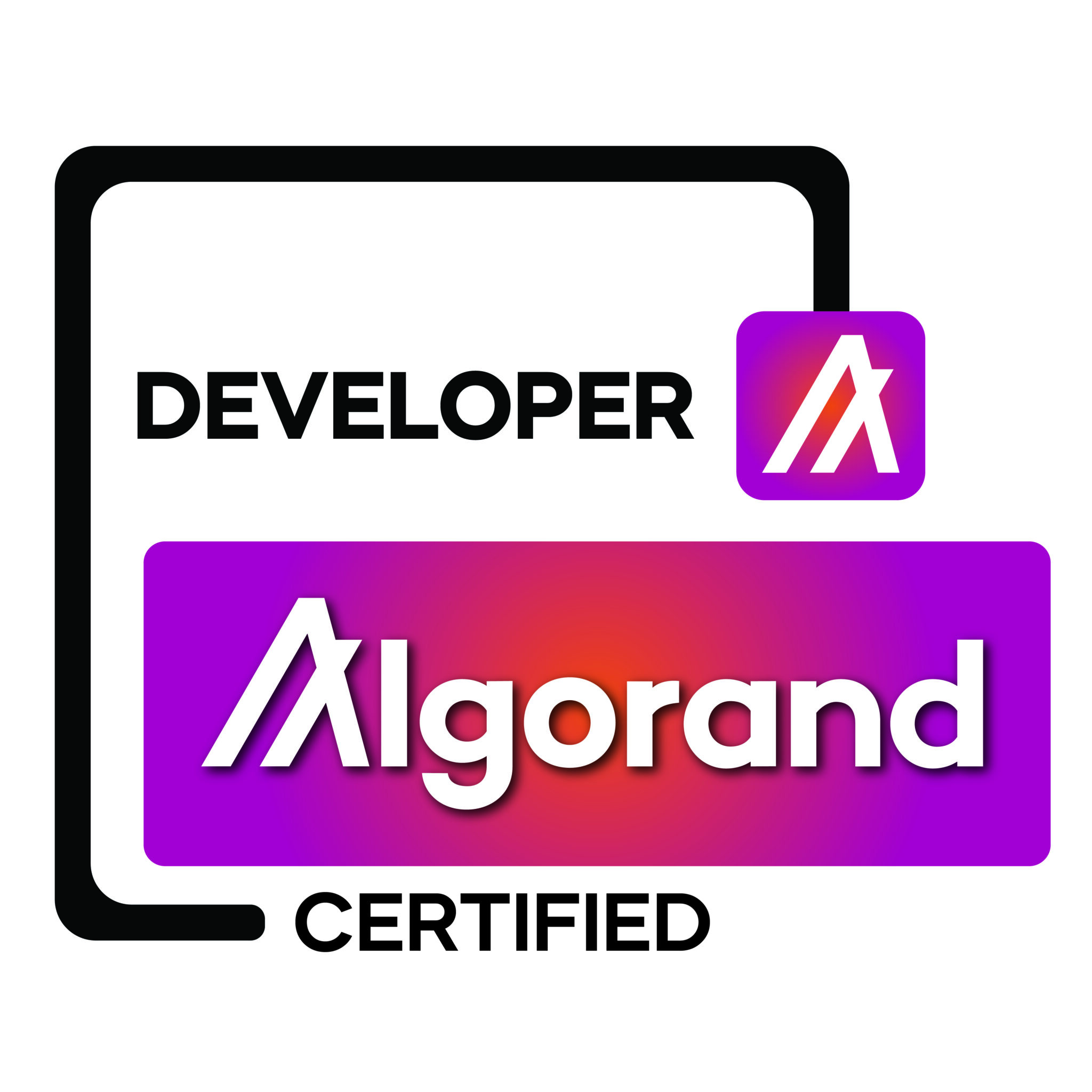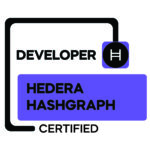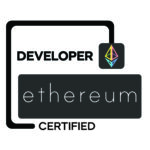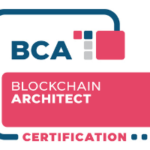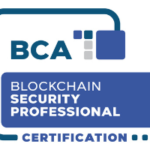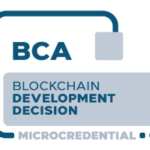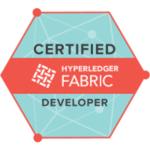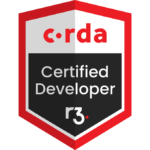Certified Multi-Protocol Blockchain Developer

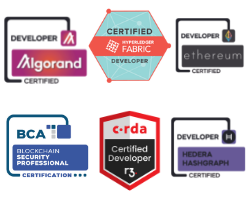
Certified Multi-Protocol Blockchain Developer
Make yourself a most capable wide-ranging blockchain engineer. Blockchain developers are earning 10% to 40% more than their web2 equivalents.
The Certified Multi-Protocol Developer program provides existing developers with a depth of knowledge in Blockchain technology, architecture, security and protocol development capabilities on multiple private and public Blockchains. You will learn the programming language Solidity to develop Smart Contracts and distributed applications (DApps) on Ethereum. To become a Certified Multiple Protocol Developer you must illustrate the ability to develop Smart Contracts and DApps on at least two additional blockchains, such as Algorand, Hedera Hashgraph, EOS.IO, R3 Corda, Hyperledger Fabric, NEAR Protocol
QUESTIONS WE’LL EXPLORE
- How does Blockchain work?
- What is Blockchain architecture and its core components.
- How does Blockchain architecture differ from other architectures?
- What are the hosting decisions to consider?
- What are the business components of Blockchain architecture?
- How does Blockchain security work?
- What are the fundamental principles in a Blockchain that help in eliminating security threats?
- Where are the security threats in an unhackable Blockchain?
- What is encryption, and what is its role in Blockchain?
- What is a blockchain security audit?
- What is Solidity and Truffle for Ethereum?
- What are ERC-20, ERC-721, ERC223 and other standards, and how do they differ?
- How do you connect a Smart Contract to a user interface?
- What happens when a transaction runs out of funding for fees, called gas?
- What’s the most commonly used Ethereum development framework?
Certificate of Completion and BCA Certification:
Achieve a Certificates of Completion and prepare for a minimum of three Certifications from R3, Linux Foundation, and the Blockchain Certification Association exams including:
How this course works:
You complete the courses within this program at your own pace and attend live events, instructor sessions, and blockchain labs as your schedule permits. LIVE sessions are regularly scheduled (monthly) and recorded for OnDemand viewing. You start when you are ready, and should you fall behind, we will send notifications encouraging you to log in and continue to completion. Upon completion, you are eligible to sit for the BCA Certification exam.
Courses in this Certificate Program
- 150 Total Hours
- OnDemand: 60 Hours
- Instructor Led: 90 Hours
- Tuition: $4,995
| Courses in this Program | Hours | Delivery Method |
|---|---|---|
| Student Orientation | 1 Hour | LIVE - Online |
| Blockchain Foundations | 15 Hours | OnDemand - Instructor Supported |
| Blockchain Development Decision | 10 Hours | OnDemand - Instructor Supported |
| Key Management | 5 Hours | OnDemand - Instructor Supported |
| Blockchain Architecture | 25 Hours | LIVE Online - Instructor Led |
| Blockchain Security | 15 Hours | Blended - LIVE & OnDemand |
| Smart Contract Security | 15 Hours | Blended - LIVE & OnDemand |
| Ethereum Developer | 15 Hours | LIVE Online - Instructor Led |
| Hedera Hashgraph Developer | 15 Hours | Blended - LIVE & OnDemand |
| Algorand Developer | 15 Hours | Blended - LIVE & OnDemand |
| Blockchain LAB - low-code | 5 Hours | LIVE Online - Instructor Supported |
| LIVE Instructor AMA - Weekly | 5 Hours | LIVE Online - Instructor Led |
| Product Demo | 10 Hours | LIVE Online - Project Based |
Courses in this Certificate Program
- 60 Additional Hours of Developer Training included
| Courses in this Program | Hours | Delivery Method |
|---|---|---|
| R3 Corda Developer | 15 Hours | LIVE Online - Instructor Led |
| Hyperledger Fabric Developer | 15 Hours | LIVE Online - Instructor Led |
| NEAR Developer | 15 Hours | LIVE Online - Instructor Led |
| EOS.IO Developer | 15 Hours | LIVE Online - Instructor Led |
Upcoming LIVE Instruction Dates
Multi-Protocol Developer Program Objectives
Upon successful completion of this intensive program, participants will be able to:
Identifying the decisions and skills needed successful Blockchain implementation;
Learn about various Blockchain platforms – Open Source and Commercial;
Understand the hosting and mining options;
Awareness of associated technologies, and integration points;
Understand the primary programming languages;
Determining the decisions surrounding the security of Blockchains;
Learn about Blockchain architecture for building a private or hybrid blockchain;
Analyze real-life use cases in Finance (FinTech)
Restate security programming basics;
Demonstrate security required for an ICO (Initial Coin Offering);
Recognize basic Blockchain security and distinguish it from standard network security;
Use tools required to build security features
Employ security practices illustrated
Connect to an Ethereum node – testRPC/parity;
Create a working environment for deploying and interacting with Smart Contracts;
Read and write Smart Contracts written in Solidity;
Illustrate how ERC-20, ERC-721/223 tokens work, create tokens, and offer them to the public with an ICO;
Illustrate the equivalent standards with other Blockchain networks.
Develop a token exchange with Ethereum using multiple different approaches;
Deploy Multisig wallets;
Design and construct a user interface that can work with Ethereum-based applications;
Certificate of Completion
Eligible for the following Certification Exams
- Certified Ethereum Developer – BCA
- Certified Algorand Developer– BCA
- Corda Developer Certification – R3
- Certified Hedera Hashgraph Developer – BCA
- Certified Hyperledger Fabric Developer – LINUX Foundation
- Certified Blockchain Architect – BCA
- Certified Blockchain Security Professional – BCA
- All Exam Fees is included in the tuition
Share your digital badge with employers, clients, investors, and team members.
Prerequisites
Students should have a minimum of 1-year software development experience in C++, Python, Java and JavaScript. Ethereum’s built-in programming language is Solidity influenced by C++, Python, and JavaScript.
Target Audience
This program is designed for software developers, software architects and other technical professionals who want to become familiar with developing Blockchain applications on different Blockchain networks. Learners will gain an understanding of the similarities and differences of various Blockchain networks and how application development is similar and different. Learners will also gain the knowledge of certain advantages and disadvantages of different Blockchain networks. Learners will experience the different developer environment setup requirements and the different development approaches of different Blockchains.
Sample Course Content
COURSE 1: Blockchain Foundations
- Module 1: Blockchain Background and Basics
- Module 2: Different Types of Blockchains
- Module 3: Consensus
- Module 4: Cryptography and Hashing
- Module 5: Smart Contracts
- Module 6: Blockchain Wallets
- Module 7: Pros and Cons
- Module 8: Public Blockchain-Based Applications
- Module 9: Blockchain and Crypto Regulation
- Module 10: Regulatory Reporting
- Module 11: Distributed Autonomous Organizations
- Module 12: Blockchain Today
- Module 13: The Trilemma
COURSE 2: Blockchain Development Decision
- Module 1 – Development Essentials
- Module 2 – Platforms
- Module 3 – Hosting and Mining Decisions
- Module 4 – Associated Technologies
- Module 5 – Development Languages
- Module 6 – Security and Implementation Goals
- Module 7 – Risk Management
- Module 8 – Digital Transformation & Summary
COURSE 3: Key Management
- Module 1: Key Management Overview
- Module 2: Key Generation
- Module 3: Key Management and Storage
- Module 4: Risks
COURSE 4: Blockchain Architecture
- Module 1: Blockchain Decision Overview
- Module 2: Blockchain Platforms
- Module 3: Hosting Decisions
- Module 4: Associated Technologies
- Module 5: Development Languages
- Module 6: Security and Implementation Goals
- Module 7: Risk Management
- Module 8: Blockchain Architecture Overview
- Module 9: Business and Technical Components of Blockchain Architecture
- Module 10: Blockchain Architectural Options
- Module 11: The Two Vital and Inseparable Parts of Blockchain
- Module 12: High-level Description of a PoC Private (permissioned) Blockchain
- Module 13: Identity, Privacy and Security
- Module 14: Blockchain Structure and Distributed Peer-to-Peer Network
- Module 15: Cryptography and Blockchain Algorithms
COURSE 5: Blockchain Security
- Module 1: Intro to Blockchain Security
- Module 2: Cryptography, Hash Functions and Public Key
- Module 3: Consensus, PoW and PoS Security
- Module 4: Advanced Blockchain and Architectural Security
- Module 5: The Blockchain User & Node Security
- Module 6: Securing Blockchain NetStake
- Module 7: Introduction to Smart Contract Security
- Module 8: Programming Vulnerabilities
- Module 9: Blockchain Specific Vulnerabilities
- Module 10: Ethereum Specific Vulnerabilities
- Module 11: DeFi Vulnerabilities
- Module 12: Secure Smart Contract Development
- Module 13: Secure Blockchain Solutions
COURSE 6: Smart Contract Security
- Module 1: Intro to Smart Contract Security
- Module 2: General Programming Vulnerabilities
- Module 3: Blockchain Vulnerabilities
- Module 4: Ethereum-Specific Vulnerabilities
- Module 5: De-Fi Vulnerabilities
- Module 6: Secure Smart Contract Development & Auditing
COURSE 7: Ethereum Developer
- Module 1: Basic Concepts and Configuring a Working Environment
- Module 2: INTRODUCTION TO SOLIDITY:
- Module 3: EXPLORING SMART CONTRACTS AND ETHEREUM PROTOCOLS:
- Module 4: FINALIZING YOUR APP:
COURSE 8: Certified Hedera Hashgraph Developer
- Module 1: Introduction to Hedera Hashgraph
- Module 2: Consensus, Governance, Wallets, and Testnet
- Module 3: Mirronet
- Module 4: Developer Environment, and Transactions
- Module 5: Network Consensus
- Module 6: Token Services and Schedule Service
- Module 7: Summary
COURSE 9: Certified Algorand Developer
- Module 1: Introduction to Blockchain, Algorand, and the Future of Finance
- Module 2: Algorand in-depth
- Module 3: Algorand Architecture
- Module 4: Innovation
- Module 5: Smart Contracts and DApps
- Module 6: Governance
- Module 7: Environment Setup
- Module 8: PyTEAL
- Module 9: Software Development Kits (SDKs)
- Module 10: Account Creation and Funding
- Module 11: Exercise – Developer Environment Setup
- Module 12: Smart Contract Introduction and Course Overview
- Module 13: Create Smart Contract with PyTEAL
- Module 14: Create Smart Contract with PyTEAL. PYTEAL DEMO
- Module 15: Deploy TEAL as a Contract
- Module 16: Smart Contract Additional Details
- Module 17: EXERCISE – Smart Contract Development
- Module 18: Algorand Distributed Applications (DApps)
- Module 19: DApp Exercises
- Module 20: EXERCISE – Algorand DApp Development
Program Info
- Dates: Rolling Enrollment
- Location: LIVE Online Instructor Led & OnDemand
- Tuition: $4,995
- Tuition Assistance
- 150 Total Hours
Additional Information
- Guest Lectures & Networking
- Student Orientation
- Weekly LIVE Instructor AMAs
Exam Voucher Included
Issuing Bodies:
- LINUX Foundation
- R3 Corporation
- Issuing Body: Blockchain Certification Association (BCA)
Exam Voucher Included
Certification Exams:
- Certified Ethereum Developer
- Certified Algorand Developer
- Certified Hedera Hashgraph Developer
- Corda Developer Certified
- Certified Blockchain Architect
- Certified Blockchain Security Professional
